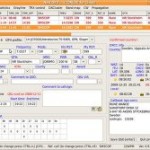Episode 50: A milestone!
Announcements:
- Russ talks about his California trip: attending the Large Installation Systems Administration conference (LISA).
- The 50th episode is a milestone - Richard explains why. See also The Internet Archive.
- Lord Drachenblut reminds us of the upcoming Indiana LinuxFest in Indianapolis, Indiana. If you'd like to register, use the promotional code LHSPODCAST50 (all capital letters) and you'll get a $15.00 discount on the ticket.
- Music in this episode is from 20lb Sounds, fronted by Dan Lynch of Linux Outlaws fame.
Topics:
- Scott, AD7MI, posted an article on his blog about moving to an all-Linux ham shack. Richard and Russ discuss the article, including Shackbox Linux, Ham Radio Deluxe, CQRLog, and more. Ultimately, Fldigi and CQRLog resulted in "100% Linux Nirvana".
- Scott also asks what we think would be the ideal Linux-based ham shack. Russ describes his shack, which he thinks IS ideal. Our hosts then discuss various soundcard interfaces:
- Most sound cards work fine, and Russ recommends the SoundBlaster series over all, but suggests staying away from the SoundBlaster Audigy SE (model CA0106) sound cards as they don't seem to work well (or at all) under Linux.
- Richard likes his Yaesu FT-897D. Most modern rigs allow a fixed-audio level connection to the computer sound card, as well as computer rig control. Russ has the Kenwood TS-570D, and it, too, is well-supported in the Linux ham libraries.
- Russ and Richard discuss the fact that most hams don't log VHF/UHF contacts, other than in contests or toward an award.
- The FCC, created by the Communications Act of 1934, included the requirement to maintain a log book in the rules. Sometime between 1983 and 1986, this requirement was dropped as the FCC determined that the information was of little use to them. (If someone can point us to a reference that identifies when the exact rule change occurred, please let us know. I was unable to find the specific change online. -Ed.)
Feedback:
- Leif, KC8RWR, writes that Internet over EME (earth-moon-earth) isn't likely to work due to the high latency involved. (This may be in reference to a comment in Episode 48.) NASA and DARPA are involved in a Deep-Space Internet project.
- Leif also asks "Isn't Morse code dead?" and wasn't it replaced by "Gerke Code"? Our hosts discuss.
- Craig, KB5UEJ, writes that he thinks Russ' audio is louder and muddier than Richard's in episodes 46 and 47. Russ agrees that the audio on a few of the recent episodes did suffer, but should be much improved now.
- Grant, KC9SJQ, comments that he doesn't see a link to Russ' screencast about SSL anywhere. Yes, it somehow disappeared, but Russ is working on it. He'll either find the file or redo it.
- William, KB9TMP, sends his comments about Episode 48 where we discuss KE9V's article that questioned the relevance of amateur radio.
- Craig, KB5UEJ, commenting about WSPR, says that you can run less than 5W on an FT-897 by reducing the audio drive from the computer to the radio. Richard points out that the reduction is often not uniform across the audio freqeuncies used, so some intelligibility may be lost. He had that problem with packet, but he'll try it with WSPR.
- Matt wants to know the artist and title of a song in Episode 48. The song was "Endline (Choose Nothing)" by I Am Not Lefthanded from the album "Yes Means No". Check out the show notes for Episode 48 for a link to the song.
Donations:
- Scott, AD7MI, sent a donation just before we recorded! Thanks, Scott.
- If you'd like to help the podcast, please consider making a donation. It's easy! Just a click on the Donate button on the web site.
Contact Info:
- Contact Richard at kb5jbv@gmail.com, Russ at k5tux@lhspodcast.info, or both at the same time at info@lhspodcast.info.
- Listen to the live stream every other Tuesday at 8:00pm Central time. Check the LHS web site for dates.
- Leave us a voice mail at 888-455-0305 or 417-200-4811, or record an introduction to the podcast.
- Sign up for the LHS mailing list.
- Sign up for the MAGNetcon mailing list.
- Thanks to Dave from Gamma Leonis for the theme music.
Music:
- Redemption Song performed by 20lb Sounds.
- Jimmy Carter, also by 20lb Sounds.
